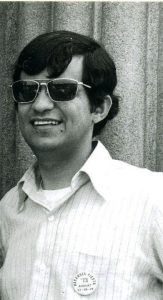Cesar Battalla

Cesar Batalla 1973
Cesar Batalla: A leader’s legacy nearly forgotten
He wasn’t a world-renowned explorer, or a high-ranking public official, or a noted businessman, but in the three decades that his activism and energy touched the lives of thousands, Cesar A. Batalla emerged as a significant figure in the political, ethnic and community life of Bridgeport.
Of the more than two dozen elementary schools in the city, two are named after Puerto Rican leaders.
Luis Munoz Marin School on Helen Street opened in 1992. The school was named after the first governor of Puerto Rico. The second, Cesar Batalla School, opened in 2007, more than a decade after the death of the local Puerto Rican activist whose legacy it honors.
The Batallas arrived in Bridgeport in the early 1950s from Aguas Buenas, when Cesar was a child. “We have always been a family that liked to explore and meet people,” said Ulises Batalla, Cesar’s brother and acting executive director of the Hispanic Chamber of Commerce.
Cesar was a normal kid who liked to go to the YMCA and showed no signs of the activist he would become. Shielded by a tight-knit family and the local Puerto Rican community, the young Cesar had little direct experience with discrimination, Ulises said.
Batalla, whose family moved from the Pequonnock to Evergreen Apartments, graduated from Bassick High School and went to the University of Bridgeport. After dropping out, he was quickly drafted, but was granted leave from the Army in Vietnam as his mother’s health failed. He didn’t make it back to Bridgeport in time to see her alive, but managed to finish his service in Fort Dix.
He then worked briefly at Citytrust before joining the gas company, where he would become community relations director.
It was when low-income Latinos picketed the gas company over a new requirement for service deposits that Batalla’s social awareness was awakened, said both Ulises and Wilfredo Matos, a former City Council member then the leader of the militant Young Lords.
Cesar talked to people in the picket lines and began learning about their problems.
From then on, he never stopped learning about social concerns — and acting on them.
In fact, Cesar Batalla dedicated his life to meeting state legislators, reaching out to the city’s youth and urging the local Puerto Rican community to fight for change.
During his lifetime, he worked with many social organizations, including the Puerto Rican Coalition, which he led for more than 20 years. Batalla took key roles in lawsuits that charged discrimination toward minorities in the city’s Fire and Police departments, as well as segregation in public schools.
And he juggled his political and social activism with his day job as community relations director for the Southern Connecticut Gas Co.
Former Bridgeport Town Clerk Alma Maya, who also hails from Aguas Buenas, said: “I remember saying, ‘Cesar, you are involved in so many things, concentrate on one,’ and he said, ‘Everything is interrelated.’ ”
“Nobody has replaced him,” Maya added. “You can take 10 people and they could never do what he did.”
He devoted much of his final years fighting to attract to Bridgeport the state headquarters of Aspira, an organization devoted to motivating young Latinos, and to promote participation in its programs.
“There was no greater champion for Latino students than Cesar — in the state,” said Alma Maya, who was executive director of Aspira and hails from Batalla’s Puerto Rican hometown of Aguas Buenas.
The Puerto Rican community, she said, has not been the same since his death.
“He not only lit fires, but he kept them going,” she said. “He was the glue that kept everybody together.”
During more than 20 years as head of the Puerto Rican Coalition, Batalla made his mark on the local political scene.
He took key roles in lawsuits that charged discrimination against the city’s Fire and Police departments, as well as segregation in the public schools.
But he could also be found fighting for those who experienced discrimination of other kinds — whether it was people with disabilities or Soviet Jews.
He was head of the Council of Presidents, a group of leaders of local businesses and civic groups. He also was active in organizations such as the United Way.
Gov. William O’Neill appointed Batalla to the state Commission on Human Rights and Opportunities. He was even a member of the Financial Control Board, the oversight group set up in 1990 to monitor Bridgeport’s municipal finances to stave off bankruptcy.
Despite his accomplishments, few young people today know who Cesar Batalla was, Ulises said. “And it was just the other day he was involved in picketing here, doing this, doing that. I feel kind of bad that that’s the reality,” he said.
As Cesar’s daughter Sara Batalla has said, “My dad was not rich. He didn’t have a doctor’s degree or anything like that. But he did things from his heart.”
Text taken from Connecticut Post artcles: New school named after Latino icon by
SUSAN SILVERS 12/24/2006 and Cesar Batalla: A leader’s legacy nearly forgotten by KEILA TORRES; 07/12/2009
Photos courtesy of the Bridgeport History Center
On a personal note, I am grateful to have known and worked with Cesar and proud to have called him my friend.
John Soltis – Assistant City Librarian
For more photos: Click here

